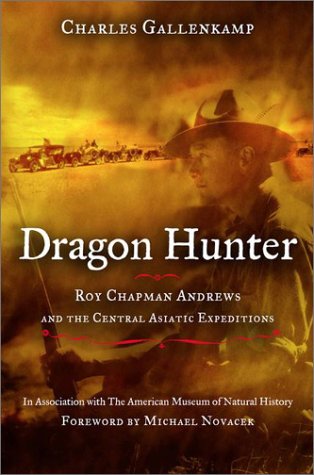 This book is not about hunting dragons. It's about looking for dinosaurs. This is evident from the jacket flap, so I knew it before starting; I just wanted to toss it out there so everyone knows it's a non-fiction biography of Roy Chapman Andrews, focusing on his time fossil-hunting in the Gobi Desert, and not a fantasy story about a guy who hunts dragons. The title evidently comes from the nickname "dragon hunters" bestowed upon Andrews' expedition by the Chinese and Mongolians he encountered, who supposedly thought that fossils were dragon bones. I'm always a little bit skeptical when a Western book cites eastern "superstitions," because I'm never quite sure if the superstitions are legitimate or simply an elaborate joke played on gullible foreigners--especially when the author appears to have used only English-language sources, many of them by Andrews himself. Still, you can't deny that it's a good title, so I guess we'll let that one slide for now.
This book is not about hunting dragons. It's about looking for dinosaurs. This is evident from the jacket flap, so I knew it before starting; I just wanted to toss it out there so everyone knows it's a non-fiction biography of Roy Chapman Andrews, focusing on his time fossil-hunting in the Gobi Desert, and not a fantasy story about a guy who hunts dragons. The title evidently comes from the nickname "dragon hunters" bestowed upon Andrews' expedition by the Chinese and Mongolians he encountered, who supposedly thought that fossils were dragon bones. I'm always a little bit skeptical when a Western book cites eastern "superstitions," because I'm never quite sure if the superstitions are legitimate or simply an elaborate joke played on gullible foreigners--especially when the author appears to have used only English-language sources, many of them by Andrews himself. Still, you can't deny that it's a good title, so I guess we'll let that one slide for now.This was an entertaining book. It doesn't really drag, except for some excessive listing of names. Honestly, I have no idea who was "high society" in New York City in the 1920s, and I certainly don't keep track of the employees of museums, so these lists meant absolutely nothing to me--the names went in one eye and out the other, and I don't really know if they were of any importance at all. I mean, they were obviously supposed to convey how important Andrews was, since he was associated with those people, but aside from a couple really big names (Rockefeller and Roosevelt, for example) they were essentially meaningless. However, the accounts of life for foreigners in China, Japan, and in the Gobi were very interesting, as were the stories about Andrews' exploits before he went to the Gobi, such as his extensive studies of whales.
That said, this is a White Man's book. By that, I mean that the native Chinese and Mongolian members of the expedition, or those who worked to help make it a reality in the government, are almost completely missing. Gallenkamp addresses the terms "boy" and "coolie" near the end of the book, explaining that they weren't really all that derogatory at the time because the Chinese used them, too, so I'll give him that. However, it's pretty easy to see that without the aid of the Chinese and Mongolians, the expeditions would have gone nowhere. Not only that, but even out in the Gobi, Andrews was not usually forging new trails, but being pointed in the right direction by native nomads. Still, Gallenkamp holds to the spirit of imperialism in insisting that Andrews was the first person to "explore" the great "unknown." Just because an area is mapped doesn't mean it's unknown, you know. It might actually mean that people know it so well they don't have to rely on a map. That said, this isn't an intentionally racist book. It tries to be neutral, and it's relatively successful on that front. Obviously Gallenkamp is a huge fan of Andrews, and I'm not really sure if he's leaving out any negative aspects that might cast a different light on the story. As with all nonfiction books, I think it's good to remain a bit skeptical when reading it--every author has an agenda, after all.
A good read, but not a compelling one. If you like fossils, explorers, or anything like that, you'll probably like this.
3 out of 5 stars.
No comments:
Post a Comment